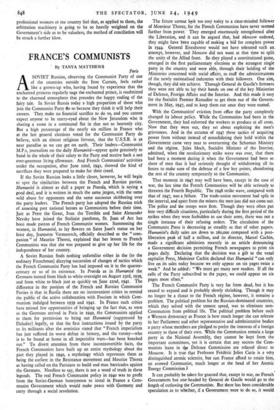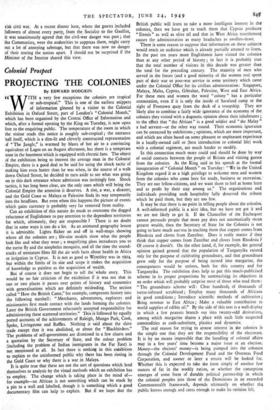FRANCE'S COMMUNISTS
By TANYA MATTHEWS
Paris ASOVIET Russian, observing the Communist Party of one of the countries outside the Iron Curtain, feels rather like a grown-up who, having found by experience that the enchanted princess regularly nags the enchanted prince, is readmitted to the charmed atmosphere that precedes the happy ending of the fairy tale. In Soviet Russia today a high proportion of those who join the Communist Pasty tlo so because they think it will help their careers. They make no financial sacrifice to do so, and you cannot expect anyone to be starry-eyed about the New Jerusalem who is sharing a room in a communal flat in that not so heavenly city. But a high percentage of the neatly six million in France who at the' last general elections voted for the Communist Party do believe, with an almost religious fervour, that the U.S.S.R. is as near paradise as we can get on earth. Their leaders—Communist M.P.s, journalists on the daily Humitnite—appear quite genuinely to hand in the whole of their salary to the Party and receive back a not over-generous living allowance. And French Communists' activities under the occupation, after June 22nd, 1941, showed the kind of sacrifices they were prepared to make for their creed.
If the Soviet Russian looks a little closer, however, he will begin to spot the similarities between the French and Russian parties. Humanite is almost as dull a paper as Pravda, which is saying a goOd deal, and it is written in much-the same jargon, with the same wild abuse for opponents and the same nauseous slobbering over the party leaders. The French party has adopted the Russian trick of annexing past national heroes as Communists before their time. Just as Peter the Great, Ivan the Terrible and Saint Alexander Nevsky have joined the Stalinist pantheon, St. Joan of Arc has been made patron of French Communist women. Summoning the women, in Humanite, to lay flowers on Saint Joan's statue on her feast day, Jeannette Vermeersch, officially described as the com- panion " of Maurice Thorez, explained that her lesson to French Communists was that she was prepared to give up her life for the independence of her country.
A Soviet Russian' finds nothing unfamiliar either in the (to the ordinary Frenchman) dizzying succession of changes of tactics which the French Communist Party has had imposed on it in the quarter- century or so of its existence. In Pravda as in Humanite the Germans turned from black to white overnight on August 23rd, 1939, and from white to black just as quickly on June 22nd, 1941. The difference in the position of the French and Russian Communist Parties is that in Rusta there are no inconvenient critics to remind the public of the active collaboration with Fascism in which Com- munism indulged between 1939 and 1941. In France such critics have missed few opportunities of bringing up the fact that, as soon as the Germans arrived in Paris in 1940, the Communists applied to them for permission to bring out Humaniti (suppressed by Daladier) legally, or that the first instructions issued by the party to its militants after the armistice stated that " French imperialism has just suffered its worst defeat in history, and the enemy—who is to be found at home in all imperialist wars—has been knocked out." To divert attention from these incontrovertible facts, the French Communists have built up an entire mythology about the part they played in 1940, a mythology which represents them as being the earliest in the Resistance movement and Maurice Thorez as having called on the Parisians to build and man barricades against the Germans. Needless to say, there is not a word of truth in these legends. The real French Communist policy in 5940 was to profit from the Soviet-German honeymoon to instal in France a Com- munist Government which would make peace with Germany and carry through a social revolution. The future cannot klok too rosy today to a clear-minded follower of Monsieur Thorez, for the French Communists have never seemed further from power. - They emerged enormously strengthened after the Liberation, and it can be argued that, had Moscow ordered, they might have been capable of making a bid for complete power in 5944. General Eisenhower would not have tolerated such an, attempt, however, and Moscow did not want at that time to split the unity of the Allied front. So they played a constitutional game, emerged in the first parliamentary elections as the strongest single party in the country and were able, through their holding of the Ministries concerned with social affairs, to stuff the administrations of the newly nationalised industries with their followers. One aim, though, they did not achieve. Through General de Gaulle's firmness they were not able to lay their hands on one of the key Ministries of Defence, Foreign Affairs and the Interior. And this made it easy for the Socialist Premier Ramaclier to get them out of the 'Govern- ment in May, 1947, and to keep them out once they were ousted.
With the Communists' eviction • from office the party completely changed its labour policy. While the Communists had been in the Government, they had exhorted the workers to produce at all' costs. Now that they were out, they set about exploiting the men's grievances. And in the autumn of 1947 these tactics of acquiring power from without instead of consolidating their hold within the Government came very near to overturning the Schuman Ministry and the regime. Jules Moch, Socialist Minister of the Interior, admitted, when the revolutionary strike wave was over, that there had• been a moment during it when the Government had been so •. short of men that it had seriously thought of withdrawing all its forces to make sure of the defence of a few key points, abandoning the rest of the country temporarily to the Communists.
That moment in 1947 may well have been, except in the case of war, the last time the French Communists will be able seriously to threaten the Fourth Republic. The 1948 strike wave, compared with that of 5947, was a, failure. The trade-union movement had split in the interval, and apart from the miners the men just did not come out. The police and the troops were firm. Though they were often put into very difficult situations, particularly during the first period of the strikes when they were forbidden to use their arms, there was not a single instance of their refusing orders. The circulation of the Communist Press is decreasing as steadily as that of other papers. Humanite's daily sales are down to 260,000 compared with a post- liberation peak of half a million, and its director, Marcel Cachin, made a significant admission recently in an article denouncing a Government decision permitting French newspapers to print six pages daily. Declaring that the decision was a gift to the venal capitalist Press, Monsieur Cachin declared that Humanite "can only live on its sales today because we only appear on six pages twice a week." And he added: " We must get many new readers. If all the cells of the Party subscribed to the paper, we could appear on six pages more often."
The French Communist Party is very far from dead, but it has ceased to expand and is probably slowly shrinking. Though it may no longer be a threat to the French regime, howevei, it remains a problem. The political problem for the Russian-dominated countries, which they solved with the utmost speed, was to eliminate non- Communists from political life. The political problem before such a Western democracy as France is how much longer she can tolerate in her Parliament and other representative and administrative bodies a party whose members are pledged to prefer the interests of a foreign country to those of their own. While the Communists remain a large party in the National Assembly, they cannot be kept from the important committees, yet it is certain that any secrets the Com- munists learn in dire Defence Commission are relayed direct to Moscow. It is true tlt Professor Frederic Joliot Curie is a very distinguished atomic scientist, but can France afford to retain him, an avowed Communist, much longer at the head of her Atomic Energy Commission ? It can probably be taken for granted that, except in war, no French. Government but one,headed by General de Gaulle would go to the length of outlawing the Communists. But there has been considerable speculation as to whether, if a Government were to do so, it would
risk civil war. At a recent dinner here, where the guests included followers of almost every party, from the Socialist to the Gaullist, it was unanimously agreed that the civil-war danger was past ; that the Communists, were the authorities to suppress them, might carry out a lot of annoying sabotage, but that there was now no danger of their tearing the nation apart. I should not be surprised if the Minister of the Interior shared this view.



































 Previous page
Previous page